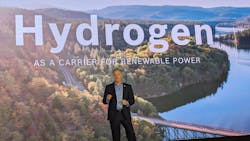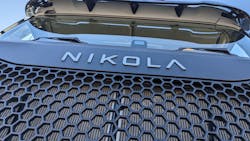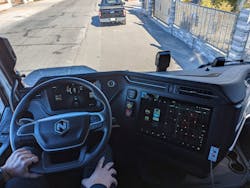Bosch doubles down on hydrogen as key to trucking’s sustainable future
LAS VEGAS—With one eye still on electrification mobility, Bosch will launch a hydrogen engine for heavy-duty long-haul applications as the Tier One supplier sees hydrogen as a critical part of future global energy systems, according to company executives appearing here at CES 2024.
Last summer, the supplier began producing hydrogen fuel cell stacks for U.S., Europe, and China truckmakers at its Stuttgart, Germany, plant. Nikola, here in the U.S., was the first North American OEM to integrate the Bosch H2 technology into its Tre FCEV Class 8 zero-emission tractor.
See also: Trucking's hydrogen future nears reality overseas
“When it comes to energy-focused innovations, we are pursuing a dual approach,” Tanja Rückert, a member of Bosch’s management board, said during Bosch’s CES 2024 Media Day presentation at Mandalay Bay on the southern end of the Las Vegas Strip, the day before the massive consumer electronics show opens to the public across the city.
She said that two-pronged approach includes optimizing traditional energy sources to improve efficiency and reduce costs. “Electrification, in particular, for its tremendous potential as a pathway to achieving net-zero goals in multiple different ways, including personal or commercial transport,” Rückert explained.
“We are also looking beyond traditional energy sources for more sustainable alternatives. We are focusing, in particular, on hydrogen, as we believe it will be central to meeting our future climate-neutral energy needs. Here, we are active at multiple points along the hydrogen value chain—from building up a production and supply infrastructure to developing innovative new hydrogen-based technologies.”
Bosch looks to strengthen ‘hydrogen value chain’
Mike Mansuetti, Bosch North America president, said the company’s consumer and commercial energy-optimization initiatives are critical parts of its growth strategies on this side of the Atlantic Ocean. “At Bosch, we’re convinced that hydrogen is one of the keys to decarbonizing our energy supply,” he said on Monday. “We’re investing heavily in hydrogen technologies and developing solutions along the hydrogen value chain.”
Bosch’s hydrogen fuel cell powertrain is leading those efforts on the heavy-duty transportation side, Mansuetti said. “In addition, we’re working on components for a hydrogen engine that uses the fuel directly—as opposed to first converting into electricity,” he explained.
See also: Hydrogen vs. BEVs: Reaching energy independence
When powered by green hydrogen, this engine would be practically carbon neutral, according to Bosch. “The technology can offer the performance of a diesel engine. On top of that, the climate benefit of the hydrogen engine increases even more when you use green hydrogen. It will be suitable for commercial vehicles in the on- and off-road segments, such as heavy-duty long-haul trucks and construction machinery.”
The Bosch president said the engine, which would be offered for both port and direct injection, is expected to launch later this year. If successful, Bosch would join other Tier One suppliers, such as Cummins, with an H2 engine designed for the trucking industry.
H2 building blocks set up net-zero future
Hydrogen transportation investments are growing worldwide. Europe boasts some of the most public hydrogen-fueling stations in the world. Here in the U.S., the federal government is pumping more than $7 billion into regional green hydrogen hubs to increase domestic production of the potential carbon-free fuel. Globally, more than $50 billion in funding is available for hydrogen projects, Mansuetti said.
“The H2 hubs are an important building block for establishing a hydrogen infrastructure,” Mansuetti said. “We at Bosch support these measures and are exploring participation in several of these hubs. Our goal is to help drive forward the clean-energy economy in North America. This is an area where we can contribute our expertise in the production and provisioning of hydrogen.”
In contrast to battery-electric trucks, which must sacrifice cargo capacity for large batteries and have long recharging times, hydrogen fuel cells and engines have the potential to offer similar refueling times and range as diesel-powered trucks.
“That is where we need the breakthrough to demonstrate that the maturity level—even with this completely new process and supply chain—is truly effective,” Thomas Wintrich, Bosch’s head of fuel cell mobility solutions, said while FleetOwner visited the Stuttgart production facility last summer. “We now have the opportunity to share experiences with our first customers. This is not only with Nikola but also in China, where our trucks are already operating. We have already accumulated nearly 3 million kilometers (1.86 million miles) on our trucks in China.”
See also: Nikola Tre commercial launch shows hydrogen trucks' viability
“What an effort by our dedicated and passionate team to create—and deliver—what we believe is the only U.S.-designed and assembled Class 8 hydrogen fuel cell electric truck on the road today,” Nikola chief executive Steve Girsky said last week.
Nikola’s FCEV has a range up to 500 miles and can refuel in 20 minutes, according to vehicle specs. The startup OEM claims its truck offers one of the longest ranges of all commercially available zero-tailpipe emission Class 8 trucks. The truck is being marketed for applications ranging from drayage and intermodal to metro-regional truckload and less-than-truckload to certain specialized hauling use cases.
“Our goal is to introduce a better, cleaner way to deliver goods to the North American market in a reliable package,” said Girsky. “Our FCEV customer pilot programs have shown strong results, with truck uptime at 98%—crucial for efficient fleet usage.”
Bosch appears as bullish on the future fleet fuel as its U.S. partner.
“As our business in the area of hydrogen production develops, we're actively exploring local manufacturing to support,” Mansuetti said. “So, on the one hand, we're enhancing energy efficiency and driving forward electrification. And on the other, we're pursuing hydrogen as a more sustainable power source.”
About the Author
Josh Fisher
Editor-in-Chief
Editor-in-Chief Josh Fisher has been with FleetOwner since 2017. He covers everything from modern fleet management to operational efficiency, artificial intelligence, autonomous trucking, alternative fuels and powertrains, regulations, and emerging transportation technology. Based in Maryland, he writes the Lane Shift Ahead column about the changing North American transportation landscape.



